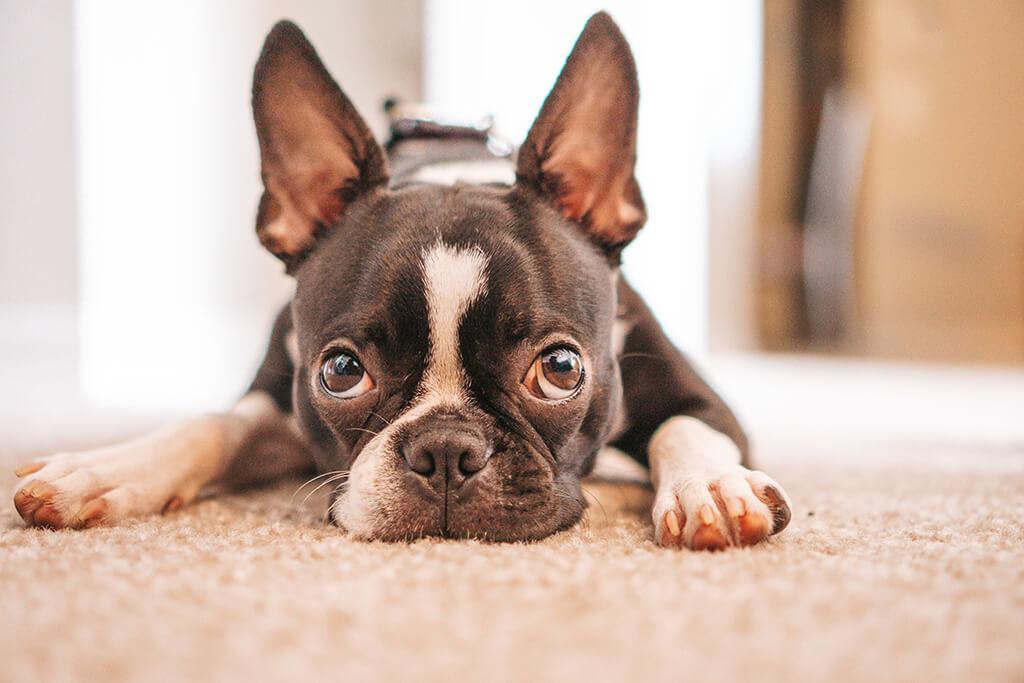Summary: In this blog, we learn all about why dogs reverse sneeze, what causes reverse sneezing in dogs, what it is, and how to help support your dog who may be struggling with their reverse sneezing…
What Is Reverse Sneezing In Dogs?
Reverse sneezing in dogs (also known as paroxysmal respiration or backward sneezing) may sound quite alarming, but normally isn’t something to be overly concerned about and doesn’t require any treatment. Occasionally, cats can also experience reverse sneezing but this is less common.
Your pup has a structure inside their mouth called the soft palate, which can be involved in the mechanics behind a reverse sneeze. The soft palate is the muscular structure at the back of your pup’s mouth that helps them to swallow, make noises and breathe. If their soft palate becomes irritated, it can go into spasm which narrows the size of their airway and makes it harder for them to breathe air into their lungs. Your pup might suddenly stand still and stretch their neck forwards to try and draw more air into their lungs and then attempt a rapid, forceful inhale through their nostrils which results in a reverse sneeze: a sound that can sometimes sound like a honk or snort.
Sometimes, a reverse sneeze can also look like your pup is choking. If you suspect that they could have swallowed something and are having trouble breathing, we encourage you to contact your vet.
Reverse sneezes are usually short-lived and rarely last longer than half a minute or so. Pups who are prone to reverse sneezes often experience these episodes periodically throughout their life. After the episode is over, they completely return to normal as if nothing happened!
What Causes Reverse Sneezing In Dogs?

Although the exact cause of reverse sneezing is not well understood, it’s thought that breathing in irritants can be a trigger, as well as anything that irritates the delicate tissues of your pup’s throat. The location of these irritants along with your pup’s respiratory tract determines whether your pup experiences a normal sneeze or a reverse sneeze. If it is closer to your pup’s nostrils, they will experience a normal sneeze. If the irritant gets to the back of their mouth, closer to their soft palate, they are more likely to experience a reverse sneeze.
Other causes of reverse sneezing may include:
- Pulling on the lead
- Perfume/Air Freshener/House/Aerosol products
- Nasal mites
- Eating/Drinking
- Smoke
- Exercising
- Becoming overexcited
Are Some Breeds More Prone To Reverse Sneezing?
Yes, it can be more common in brachycephalic (flat-faced) breeds and those with short snouts, so breeds like Shih Tzus, Border Terriers, and Pugs. These breeds have a longer soft palate due to the shape of their head so it can sometimes get sucked into their throat whilst breathing which triggers a reverse sneeze.
Is There A Solution For Reverse Sneezing In Dogs?
Thankfully, although a reverse sneeze can look quite scary, it’s actually a relatively simple issue. As long as your pup’s reverse sneezing is fairly infrequent and isn’t impacting their quality of life, they shouldn’t require any treatment.
However, if your pup reverse sneezes for the first time and you are concerned about it then we encourage you to get in touch with your vet.
You should also contact your vet if they start to experience prolonged episodes of reverse sneezing, the frequency becomes noticeably more or they’re very severe.
In some cases, depending on your dog and the underlying cause, your vet may prescribe anti-inflammatories, antihistamines, or decongestants to help. Also, there is a more serious condition, called tracheal collapse, that can look very similar to reverse sneezing so it’s important to be sure that you are not mistaking this for a reverse sneeze.
If your dog is experiencing an episode of reverse sneezing, and you’re used to them doing so, you can help them by gently massaging their throat which can soothe the spasm and help to dislodge the irritant by encouraging them to swallow. Removing the cause of the reverse sneeze, for example treating nasal mites if they are present, will also help to decrease the chance of this happening again.
Sources
Author Loos, Shelby DVM “Reverse Sneezing In Dogs: Is It Normal?” Pet MD, Jul 31. 2020 https://www.petmd.com/dog/general-health/reverse-sneezing-dogs-it-normal
Author Williams, Krista DVM BSc and Ward, Ernest DVM “Reverse Sneeze In Dogs” VCA Hospitals https://vcahospitals.com/know-your-pet/reverse-sneeze-in-dogs






